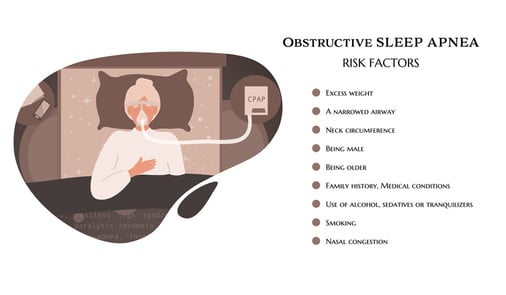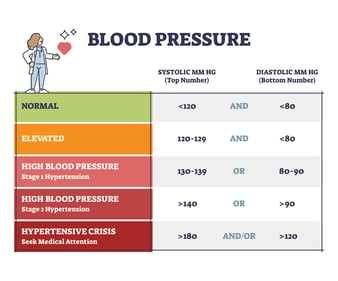Did you know those who suffer from sleep apnea have been linked to developing a wide range of other health conditions including high blood pressure? This article discusses how these two conditions go hand in hand and an overview of what sleep apnea is, how it may be linked to high blood pressure, and when it might be a good idea to discuss your concerns with your doctor.
What Is Sleep Apnea?
Sleep apnea is a type of sleep disorder that impacts your breathing while you are asleep. This condition causes your breathing to frequently stop or otherwise become obstructed for several seconds or longer throughout the night. Each episode, which may occur several times each hour, typically results in snorting or choking sounds as your body returns to typical breathing. There are two types of sleep apnea, which are based on the specific reason for your breathing problems.

Obstructive sleep apnea is the most common type of sleep apnea, which is caused by various types of blockages to your airway. Central sleep apnea results in similar symptoms, but this type of sleep apnea is caused by your brain not sending the correct signals to tell your body to breathe while you are asleep. Both types of sleep apnea can make you more likely to develop high blood pressure and other types of health concerns.
How Does Sleep Apnea Impact Blood Pressure?
Sleep apnea's disruptions to your sleep can make you more susceptible to developing a wide range of secondary health conditions, including high blood pressure and related heart conditions. This condition causes your blood oxygen levels to drop during each obstruction episode, which temporarily increases your blood pressure. These fluctuations can significantly strain your cardiovascular system over time, which can eventually lead to chronic high blood pressure and heart problems. Other secondary conditions sleep apnea may lead to include:
- Type 2 diabetes
- Liver problems
- Metabolic syndrome
- Problems associated with certain types of medication and surgical procedures
You may also experience other problems associated with frequent fatigue if your sleep apnea has a significant impact on your sleep, such as difficulty concentrating during the day, irritability, and an increased susceptibility to car accidents and other types of accidents.
Common Symptoms of Sleep Apnea
The disruptions associated with sleep apnea frequently interfere with your sleep, although you may not always make the connection between poor sleep and a more serious medical condition on your own. Fatigue that is associated with disrupted sleep and symptoms associated with it, such as a headache, dry mouth, difficulty concentrating, and irritability, are the most common signs that you will notice once you are awake. Other people in your home may also notice your unusual breathing patterns, excessive snoring, and snorting sounds as your body returns to normal breathing.

Common Symptoms of High Blood Pressure
It can be difficult to know if you have high blood pressure if you are not intentional about having it checked regularly because it often has no symptoms. This means that abnormal blood pressure readings may be the only way to detect this condition. However, it is often linked to heart conditions and other medical conditions that do result in symptoms and disruptions to your life.
When to Consider Discussing Your Concerns With Your Doctor
 You may not be able to tell if you have sleep apnea on your own, but it can be helpful to discuss your concerns with your doctor if you find that not getting enough sleep is disrupting your productivity, relationships, and other areas of your life. Your doctor will likely recommend a sleep study, and combining the data obtained in this study with a medical exam will help your doctor determine the best possible treatment options for your situation.
You may not be able to tell if you have sleep apnea on your own, but it can be helpful to discuss your concerns with your doctor if you find that not getting enough sleep is disrupting your productivity, relationships, and other areas of your life. Your doctor will likely recommend a sleep study, and combining the data obtained in this study with a medical exam will help your doctor determine the best possible treatment options for your situation.
For more articles on wellness and how LifeSpring Community can help you or a love one in need of long or short term care, we welcome you to contact us.


